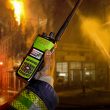NENA’s i3 standard approval delay continues
One of the more anticipated steps in public-safety’s migration from its current legacy 911 networks to next-generation 911 (NG-911) systems is the approval of the National Emergency Number Association (NENA) i3 guidelines, which are expected to provide public-safety answering points (PSAPs) with an IP-based roadmap to follow in making the transition to the next-generation platform.
Of course, the promise of NG-911 is that it will support text, data and video communications — not just voice, which is the limitation of current legacy 911 systems — that have become commonplace for consumers that are increasingly enamored by their versatile computers, smartphones and tablet devices. After all, if you can send a text message to your technology-illiterate grandmother, shouldn’t you be able to send one to a 911 center?
While NENA technical staffers have been careful to note that i3 is not NG-911, it does represent a significant step toward meeting the next-generation vision. And, by most accounts, work on the i3 document has been completed for some time. However, in late March, a vote to approve i3 was delayed because of a “last-minute procedural complaint,” according to Jeff Wittek, Cassidian Communications’ vice president of corporate business development.
Multiple attempts by Urgent Communications to determine the nature of the procedural complaint have yielded no answers. NENA officials are being tight-lipped on the matter as the organization’s investigation into the complaint continues.
Trey Forgety, NENA’s government affairs director, acknowledged that i3 was not part of the NENA board’s agenda yesterday, so it was not approved during that meeting. The next possible meeting for i3 to be considered would be conducted in early June, before the annual NENA conference, which will be conducted in Minneapolis this year.
Forgety declined to speculate whether i3 would be on that June agenda or provide any information about the nature of the procedural complaint. However, Forgety said the NENA board wants to be “absolutely certain” that all rules are followed properly in the approval of i3, which is “potentially the biggest standard that NENA has put out.”
In the past, Intrado CEO Stephen Meer has raised concerns about i3, claiming that the document provides more of a functional definition of what is needed than a detailed standard that PSAPs and vendors follow to ensure that migration to NG-911 can be executed with standards-based interfaces.
“Intrado supports i3 but there are problems within the current draft document that need to be fixed before it is adopted by NENA,” Meer said today in a statement.
Meanwhile, other vendors in the 911 sector are anxiously anticipating the adoption of the i3 document, which many believe may jumpstart an era of unprecedented competition among vendors in the emergency-calling industry. Two weeks ago, a group of eight vendors issued a press release urging “immediate approval” of the i3 document.
“There’s no reason to wait any longer,” Bill Hughes, vice president of safety and security business development of TeleCommunication Systems (TCS), said during an interview. “We believe that the input from the industry has been listened to and incorporated into the standard. There’s no benefit to anyone by delaying.”
But some industry sources note that Intrado helped drive the establishment of the Request for Assistance Interface (RFAI), a standard adopted by ATIS standard endorsed by NENA as a transitional element. However, RFAI is only an interim standard, Wittek said.
“ATIS recognized that this RFAI protocol was merely interim and was designed to be used only until i3 was approved,” he said. “It actually says that in crystal-clear words in the specification about 10 times.”
Wittek said it is “disappointing” that approval of the i3 document has been delayed because of a procedural complaint but understands NENA’s need to be careful about its adoption, so the important guidelines do not get mired in a long-term dispute that could hamper the rollout of next-generation 911 systems.
Without more information, it’s difficult to assess the procedural complaints that have led to the i3 document’s approval being delayed. However, it is important that there is no doubt about the legitimacy of the i3 guidelines when they are adopted, so any due diligence that NENA can do upfront to ensure that happens should be welcomed by the industry.
What do you think? Tell us in the comment box below.
Related stories:

















